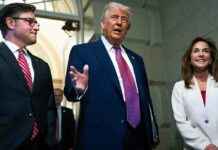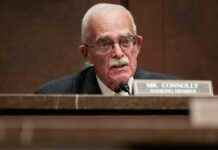The German Election: A Critical Transition of Power
On Sunday, Germans headed to the polls for the 2025 federal election, marking a significant moment in the country’s political landscape. As the German parliament gathered for its final regular session before the election, the anticipation was palpable. The looming question on everyone’s mind was who would emerge as the new leader to take over from the current chancellor, Olaf Scholz, and steer Europe’s largest economy into the future.
A Shifting Political Landscape
The Christian Democratic Union (CDU) and its sister party, the Christian Social Union (CSU), have been leading the polls in the run-up to the election, positioning Friedrich Merz as a strong contender for the chancellorship. However, the far-right Alternative fuer Deutschland (AfD) is predicted to secure the second spot, surpassing Scholz’s Social Democratic Party (SPD) and the Greens, who were part of the previous ruling coalition that dissolved in late 2024.
This shift in the political landscape marks a departure from the outcome of the 2021 election, where the SPD emerged victorious, followed by the CDU/CSU, with the AfD coming in fourth. The upcoming election promises to reshape the German political sphere, setting the stage for a new era of governance.
The Voting Process and Coalition Building
As Germans cast their ballots, they will have the opportunity to vote twice—once for a representative to serve their constituency and once for a party list. The latter vote will determine the proportional makeup of the Bundestag, Germany’s parliament, as parties send their candidates to Berlin to ensure adequate representation.
Following the election, attention will shift to the coalition building process, a critical phase in German politics. With no single party likely to secure an absolute majority, coalition partners must be sought to form a ruling majority. This intricate process involves extensive negotiations and the drafting of a coalition agreement outlining shared policy objectives and governance plans.
Experts predict that the Conservatives (CDU/CSU) will secure the highest share of votes, but they will need one or possibly two coalition partners, most likely the SPD and/or the Greens. All major parties have ruled out forming a coalition with the far-right AfD, signaling a united front against extremist ideologies in German politics.
The Role of Smaller Parties
The entry of smaller parties, such as The Left, the Free Democratic Party (FDP), and the Bündnis Sahra Wagenknecht (BSW), into parliament could significantly influence the composition of the government. These parties, hovering around the 5% threshold needed for parliamentary representation, may hold the key to forming a majority government or blocking constitutional changes requiring a two-thirds majority.
The AfD’s performance in the election will be closely monitored, given its growing popularity despite controversies and investigations. The smaller parties, often overlooked in mainstream discourse, have the potential to shape the political landscape and play a pivotal role in shaping Germany’s future trajectory.
Navigating Early Elections
The decision to hold the election ahead of schedule stemmed from the collapse of the traffic light coalition, composed of the SPD, the Green party, and the FDP, in November. Internal disagreements and conflicts over economic and fiscal policies led to the coalition’s dissolution, prompting a snap election—a rare occurrence in German political history.
Chancellor Scholz’s call for a confidence vote in himself and subsequent dissolution of parliament set the stage for the upcoming election. German President Frank-Walter Steinmeier’s formal disbandment of the lower house marked the beginning of the electoral process, culminating in the eagerly awaited Sunday vote.
As the nation awaits the election results and the subsequent coalition negotiations, the future of German governance hangs in the balance. The outcome of this critical juncture will set the course for Germany’s political landscape and shape its interactions on the global stage.
—
This article has been expertly crafted to provide a comprehensive overview of the German election, capturing the essence of the political dynamics at play and the implications for the future. The engaging narrative and insightful commentary aim to inform and captivate readers, offering a nuanced perspective on this pivotal moment in German politics.

























